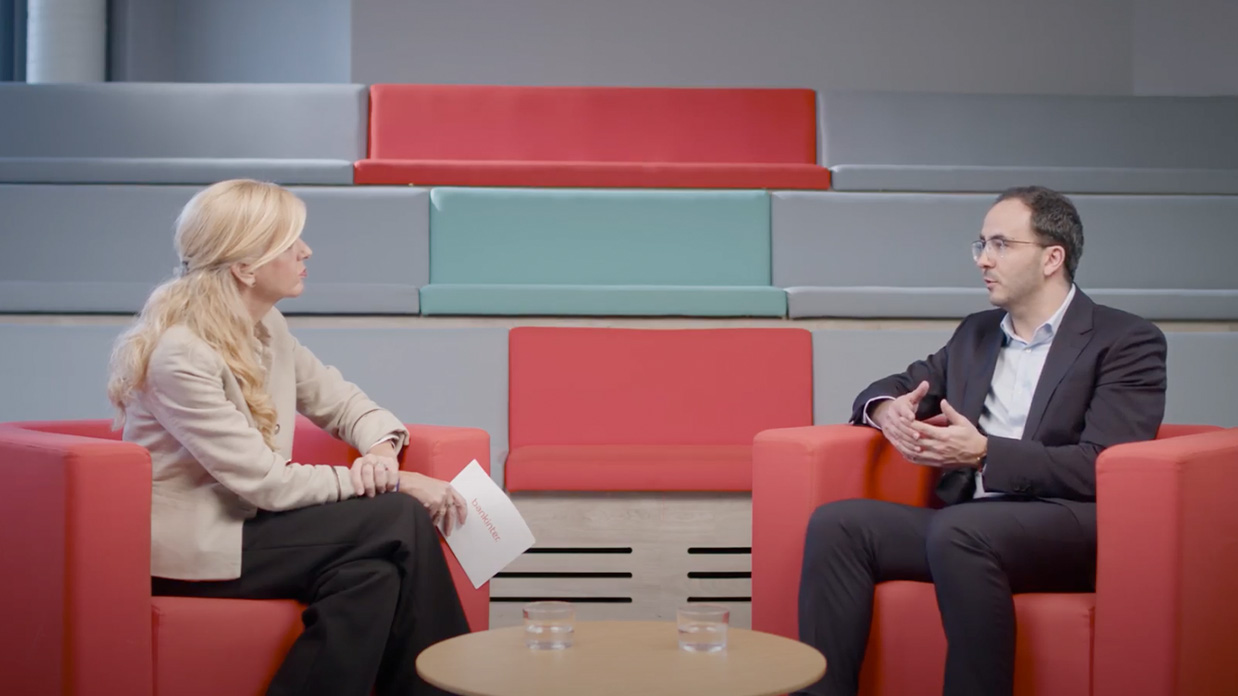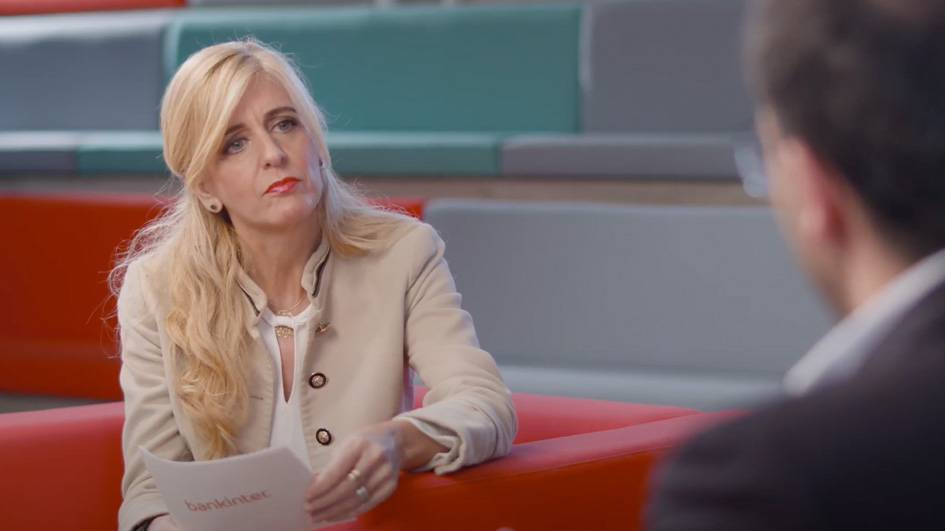We use first and third-party cookies for analytical and statistical purposes and to show you personalised advertisements based on a profile compiled from your browsing habits (e.g. pages visited). For more information, click on our Cookie Policy. You can accept all cookies by pressing 'Accept', you can reject all cookies by pressing 'Reject', or you can customize your choice by pressing 'Manage'.

The addendum is launched: the second triennium of European funds has started.
Bankinter is analysing with experts from the consulting firm FI Group the opportunities that will open up this year and the sectors that will benefit most from the funds.
Emma Montserrat, head of European Funds and deputy assistant managing director at Bankinter, talks in this first interview with Gerard Brinquis, Strategy & Grants director and head of European Funds at FI Group, about the key features of this second triennium and its impact for Spanish corporates.

Emma Montserrat: Gerard, what can we expect in 2024? It seems the new addendum will bring new aid and new funds. How are they going to be reflected in new calls?
Gerard Brinquis: The year 2023 ended with a significant acceleration in funds. We had major resolutions like the Agri PERTE and the Naval PERTE, but that wasn't all. Resolutions of other funding calls are currently under way for sectors such as Transmissions, Hydrogen Pioneers and Hybrid Storage. With the addendum for 2024 already approved by the European Commission, albeit pending ratification by the Council, the year ahead promises to be extremely intense. If 2023 saw a genuine explosion of calls, ¿2024? we can expect the same trajectory this year as well.
It is important to bear in mind that the addendum comes on top of a recovery plan of which 45% has already been executed. Made up of 94 billion euros, the addendum will stimulate new projects and initiatives. Non-refundable subsidies account for 7.7 billion euros, 2.6 billion euros stem from the RePowerEU plan, again in the form of subsidies, and over 84 billion euros are available for loans.
The new addendum will structure the calls and financing mechanisms into three verticals. Firstly, existing calls will see their allocations strengthened, with a greater scope for projects and improved financing types. The second vertical corresponds to new calls with specific challenges and a very important advantage: after three years of witnessing how they are structured, the capacity for anticipation is much greater. Experience is a genuine plus. And thirdly, PERTEs will remain as important as ever in this next triennium.
Emma Montserrat: What type of calls are expected to be transversal and benefit the entire productive fabric, and which are more aimed at specific sectors?
Gerard Brinquis: I'll use the same simile, Emma, as with the previous question. In terms of recurring calls, the ones that already existed, they are now more transversal: every sector is eligible and we are seeing a steady increase in the budgets. A clear example is public-private partnerships, the old Partnership Challenges. This call is currently open but it won't be the only one. The CDTI programmes for research and innovation are also still in force, although we are starting to see some sectorisation. The new lines published for 2024 are focused on health and aeronautics.
With regard to new calls, there is a distinct tendency towards sectorisation. For example, aeronautical and space technology programmes will dominate the first half of the year. For the tourism sector we have the last mile call, which is endowed with more than 100 million euros, while the agri-food sector will greatly benefit from the Data Space. Then we have the PERTEs, which although sectorised are actually open to any company from any sector if they can find a way to participate.
A few weeks ago the Decarbonisation PERTE was launched with a budget of more than one billion euros. This is the great challenge for the heavy and manufacturing industries, and the first major challenge for 2024, but we also have the third and fourth versions of the VEC PERTE for electric and connected vehicles, the second version of the Agri-Food PERTE and the PERTE for Circular Economy, in both its textile and plastic versions.
Emma Montserrat: In the last three years we've been on a steep learning curve as we've had to navigate a completely different type and volume of funding. What message can we give to corporates who missed out during the first round? What opportunities are available to them now?
Gerard Brinquis: The first thing to say is that the opportunity is still out there for any company that understands how financing mechanisms work. Forty-five per cent was executed in the first three years and now there is an additional 94 billion for the 2024-2026 period. I would encourage any company to rise to the challenge and seize the opportunity.
The next thing I would say is that in 2023 the European Commission promoted new public policies to improve financing incentives, with improvements in regulation, the general block exception rules for different categories and the 'de minimis' (smaller amounts of aid) scheme, but it also created new temporary aid frameworks to stimulate new projects as part of a concerted campaign to curb the relocation of firms outside the EU, which only benefits major powers like Asia and the United States.
My recommendation? Understand how the mechanisms work and then take the risk because the funds are there. Over half a million projects were executed in Spain during the first triennium. I think we really have to seize this extraordinary opportunity, and above all seek expert advice. We have a very important advantage on our side: all the experience we've gained during the first three years. It's a very high added value.
Emma Montserrat: Many of the projects we've seen in the past three years are long and complex, requiring months of work and extending over time. What is the outlook for them in 2025 and 2026?
Gerard Brinquis: I always recommend corporates develop a dual vision. A short-term vision: understanding what opportunities exist today and taking advantage of them if they truly align with the company's strategic plan. But, above all, looking ahead to 2025 and 2026. With the time lag between the plan and the addendum, in 2025 and 2026 we will be talking about approximately 44 billion euros more each year.
We have to take advantage of these additional funds, and we are advising our customers on how to get the most out of this double speed: seizing the opportunities available today, but having a strategic vision and thinking about the investment, spending, energy efficiency or digitalisation projects they are going to undertake in 2025 and 2026. This will help them decide whether they can accelerate those projects given the opportunity for funds and try to execute them sooner, or whether as a company they have to rethink the scope of those projects and be a little more ambitious in order to leverage this public financing.
Emma Montserrat: Would it be true to say that this is going to be the year of financing? How are the 84 billion euros of loans going to be channelled? What are they going to be used for?
Gerard Brinquis: Indeed, the first triennium was extremely focused on non-refundable subsidies and in this second triennium we are talking much more about financing. Of the 94 billion euros available, approximately 28 billion will reinforce the PERTES but that leaves more than 65 billion which will be channelled through the ICO, the Official Credit Institute. They are financing mechanisms with very specific challenges. Up to 12 tools are being structured to channel these funds: sustainability, green challenges, entrepreneurship and, above all, financing and support for SMEs. Bankinter, with all the experience gained and the support you can give to the ICO, is in a very strong position as a major player in the field: you understand the mechanisms and the challenges, and you have all that previous experience in the recovery mechanism.


